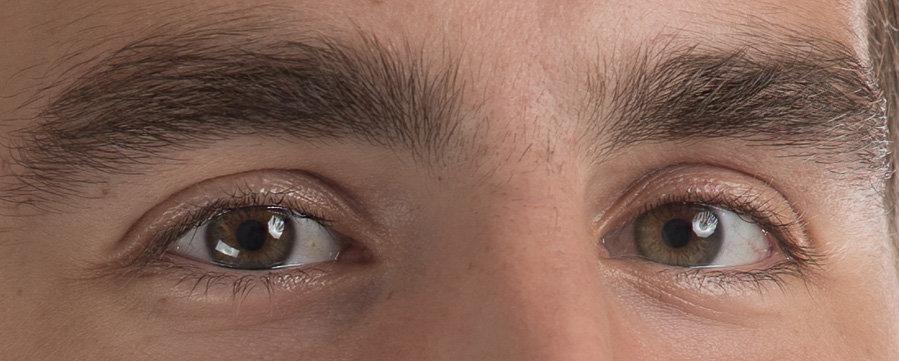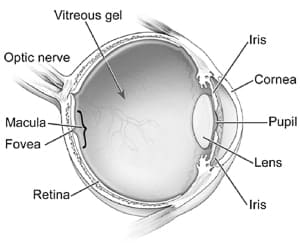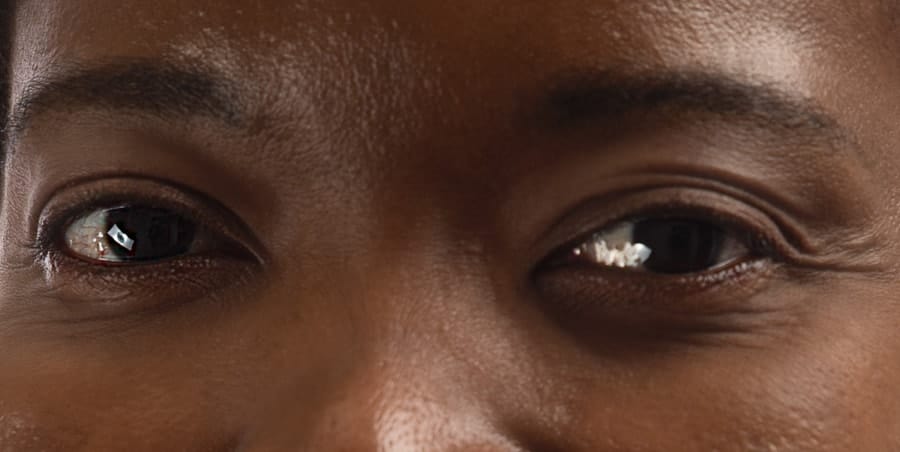Can Camera Flashes Damage Your Eyes

Have yous ever wondered whether the flash from a speedlight or a studio strobe could damage someone's eyes? Subsequently all, they tin can exist mighty bright! On the other paw, photographers accept been using wink for decades. Yous'd think that if there was a problem, it would be pretty widely known by now. Models and celebrities have been photographed thousands of times with wink and oasis't gone blind. Heck, my optician uses a pretty darn brilliant wink when taking a photograph of my retina. So, what's the story?
Back in 2015 in that location was a cursory furor after the Daily Mail service, a UK tabloid with occasional stories of dubious veracity, ran a story from Cathay which claimed that a three-calendar month-former baby had been permanently blinded in one middle past a photographer using wink in a close-up photo. The fact-checking site Snopes.com tracked the story back through several iterations and questionable sources, yet was unable to find whatsoever details about the story (like the names of the parents) nor were there any references to a doctor's diagnosis. Most maternity wards in hospitals allow, even encourage, wink photography of newborns and a few explicitly state that flash won't hurt a baby. Nevertheless, the internet beingness what it is, this story pops upwards every one time and a while.

Yes, in that location are means that extremely vivid lights can damage someone'southward eyes. However, photography flashes, at to the lowest degree for the vast majority of people in the vast majority of circumstances, aren't harmful.
There is something called "wink blindness," when the retina gets also much calorie-free and you tin't see conspicuously. Sometimes you just see a very brilliant spot for a while. However, flash blindness is a temporary condition. Every bit the retina returns to normal, so does your sight. If yous're looking straight at a speedlight or studio strobe as it flashes, you've probably experienced wink blindness. And your sight returned to normal in a matter of seconds.
Please note that I am not an ophthalmologist nor a medical physician. What follows is based on some substantial research, but should not be considered definitive advice for everyone or anyone. This article just synthesizes what I've establish over the past few weeks of research.
How Tin You lot Damage Your Eyes?
At that place are basically ii ways your eyes tin be damaged from light. Information technology could go out you lot with using glasses or Pure Optical contact lenses. First, through a thermal reaction where the low-cal heats upward eye tissue and cooks or burns it. 2d, through chemical reactions in which photons of light are powerful enough to break the bonds of molecules, leaving complimentary radicals and damaged molecules in their wake.
And there are two ways to make that damage happen: through exposure to extremely vivid low-cal for a period of time or to extremely focused light, as well for a period of time.
Yous've probably heard that you shouldn't wait direct into the sun. That's because the brightness of the sun, combined with the UV light it emits, can damage optics. If a lite is too bright, it can overstimulate the retina, that part of the eye that converts low-cal into images. In that style, it'south kind of like a camera sensor. The retina and then sends image data to the brain via optic fretfulness. When very bright lite hits the retina, it tin overstimulate the retina'due south cells, which release as well many chemic signals, which tin harm the back of the eye. A glance at the sun isn't a problem. Staring at the sunday for a prolonged period of time is. As with the retina, your camera'due south sensor tin be damaged by long exposure to the sun, especially when the rays are concentrated by the lens into one spot.

The flame of a welder's torch is also extremely brilliant and can cause eye damage with prolonged exposure. That'due south why a welder's protective gear includes very night glass. Welder'due south glass is recommended by some for viewing a solar eclipse.
Highly-focused light can burn the centre. That can be a good thing, similar using lasers to repair a detached retina. Or information technology tin can be a bad thing, when a highly-focused beam of light burns part of your retina. Think of how a magnifying drinking glass can concentrate the dominicus's rays and set fire to a piece of paper. (Most DSLR manuals warn against looking through the viewfinder directly at the sun, for this reason.) The same thing happens with powerful lasers—one reason airlines and the FAA are concerned about a few instances of people shining lasers at shipping cockpits.
Meanwhile, UV-A rays tin can damage the macula, responsible for your central vision, and UV-B rays tin damage the front office of your eyes. Excessive UV calorie-free exposure is associated with macular degeneration, cataracts and pterygium, a growth that blocks part of the cornea. A hefty bout of exposure to sunlight and glare, like a long sunny solar day at the beach or on the ski slopes, without sunglasses, can result in photokeratitis, or corneal sunburn. Speedlights and studio strobes accept filters that block the UV low-cal they emit. (In gild to do UV wink photography, yous need a specially modified camera, special UV lights or wink with the filters removed, and special spectacles to protect your eyes.)
There is some evidence that Caucasians and people with bluish eyes are more susceptible to damage from light exposure. And there was a study of Chesapeake Bay watermen, who spend their days dealing with vivid, reflected lite on the h2o, found that prolonged exposure to bluish light increased the run a risk of age-related macular degeneration. There are likewise several medical conditions which brand people somewhat more than susceptible to middle damage from light.

Three Reasons Flash is Condom
Length of Exposure
Several sources stated that you'd have to be staring at the sun for a while, 15 to thirty seconds, before starting to go permanent damage in your optics. Long before that, the effulgence would be painful plenty you'd likely close your eyes anyhow. The journal JAMA Opthamology recently discussed a case where a 12-twelvemonth-erstwhile Florida girl had damaged her retina after staring at the dominicus for about 1 minute.
While a flash is bright, it often only lasts a tiny fraction of a second. Even repeated firings of a flash but sum to a fraction of a second. A lot of speedlights have a flash duration of between 1/200 and 1/20,000 of a second. Many studio strobes accept a duration of 1/200 to 1/5,000 of a second or less. Twenty flashes of a studio strobe at ane/one thousand of a second might simply amount to 1/50th of a second full exposure.
Intensity
While it may seem bright, studio strobes and speedlights aren't all that intense. Light falls off dramatically the moment light leaves your flash because of the manner it spreads out. It begins to lose intensity according to the inverse square law. If your flash illuminates an surface area of one foursquare foot at a distance of one foot, it will illuminate an area of four square feet at two feet, 9 square anxiety at iii feet distance and so on. If a flash seems actually intense at a altitude of one foot, doubling the distance to two feet means just i quarter as much light hits the subject at any one point. Double that once again to four feet away and the light will accept only 1/sixteenth of the intensity it initially had. Move to eight anxiety away and just 1/64 of the intensity remains.
It's even less intense if you're using bounce cards, diffusers, umbrellas, soft boxes and gels.
Not Highly Focused
While speedlights and studio strobes can be bright, they're non very focused, even if you put a snood on them. The light spills and bounces in all directions. The farther the light is from the field of study, the more than diffuse it is. For an exercise, take a light amplification by stimulated emission of radiation arrow and betoken it at a wall. See if y'all can get any combination of flash gear and modifiers to focus the flash calorie-free down that much. Impossible! Move the flash back a bit and information technology is even more difficult to focus it downward to a small area.
The Verdict
As you lot've seen, there are several ways light can damage your eyes. Unless yous suffer from some specific condition that makes your eyes particularly susceptible to injury from lite, flash photography isn't going to be a trouble.
Then, burn down upwards those strobes and warm upwardly your speedlights. Shoot away. Your discipline is probably doing far more harm to their eyes during their beach or ski vacation than your flash will e'er do.
Source: https://improvephotography.com/54202/can-a-camera-flash-hurt-your-eyes/
Posted by: dixonsularoat1955.blogspot.com


0 Response to "Can Camera Flashes Damage Your Eyes"
Post a Comment